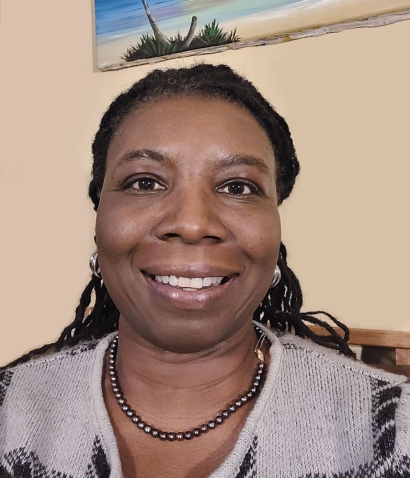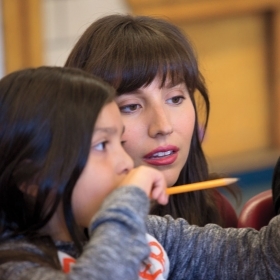“We can think of life as a bunch of puzzle pieces that we are trying to add to a picture that we don’t really know,” says Sheron Fraser-Burgess ’87. You can forgive her for being philosophical. She is a philosopher, after all (Ph.D., University of Miami 2005). The “puzzle” she has spent her life piecing together is really a question: What contributes to human flourishing?
One early puzzle piece that clicked into place for her was the opportunity of education. The daughter of Jamaican immigrants, Sheron had been in the United States only seven years before she arrived at Wellesley in 1983. But although she had been a star biology student at her Miami high school (Jeff Bezos was valedictorian in the class ahead of her), she struggled in her college science classes and felt she “could not compete” with classmates who were better prepared for calculus 2 and organic chemistry. “Seeing my dream of being a neurologist fade was very traumatic for me,” she remembers.
Yet sometimes when a puzzle piece doesn’t fit, reorienting it can help, and Sheron recognized early on that she had a “capacity to pivot” that could serve her well. She went on to major in English (with honors), teach at her former high school, earn a master’s degree in education, and then travel the world for three years as a Christian missionary in campus ministry.
After returning to the classroom from abroad, the big picture started to become clearer. She was back in Miami, teaching sixth grade, and was disheartened to discover that many of her students were already so far behind academically that they would struggle to realize their dreams, just as she had. She began to piece together how systems of education and intergenerational disadvantage collided to trap students, and she began to nurture new ambitions. “The philosopher in me started to come alive. It was a hidden dream, impractical,” she recalls. “I didn’t know any Black women who had Ph.D.s in philosophy.”
As a professor in the philosophy of education, Sheron has spent the past 17 years as a “teacher of teachers,” training teachers, administrators, and doctoral candidates about the philosophical foundations of education and “how to develop and cultivate people—people-to-be—in the classroom.” Another area of her expertise is multicultural education and the ways in which race works within the context of education. “It wasn’t until I was a professor that I started to formulate a paradigm for where systemic racism was at work in education,” she says.
As an immigrant from the Caribbean, Sheron says she didn’t have a good reference for understanding how racism worked in the American context and in her own life until she became the wife of an African American man and mother to an African American son. Her research in this area led to a book, co-edited with Jessica Heybach, Making Sense of Race in Education, which helps equip teachers to deal with matters of race in the classroom. She is also finishing up a two-year project, funded by the Library of Congress, to develop an anti-racist social studies curriculum for Indiana public schools that is based on primary source texts.
This winter, Sheron was in the middle of a sabbatical leave, pursuing new lines of inquiry into human flourishing. She had just completed a semester as a visiting scholar at the Wellesley Centers for Women, where she explored the theoretical underpinnings of womanism, a theory of feminism rooted in the experiences and concerns of Black women. And she had executed yet another pivot: In 2021, she and her husband (a chaplain she calls “my muse”) launched a consultancy, Being Better Humans, which develops curricula, workshops, and strategic plans that promote cross-cultural community building.
Life is a puzzle never fully solved, and at 57, Sheron is far from putting the final piece into place. But the full picture is starting to come into view. “I can say now that my capacities have been fully realized,” she says.






We ask that those who engage in Wellesley magazine's online community act with honesty, integrity, and respect. (Remember the honor code, alums?) We reserve the right to remove comments by impersonators or comments that are not civil and relevant to the subject at hand. By posting here, you are permitting Wellesley magazine to edit and republish your comment in all media. Please remember that all posts are public.